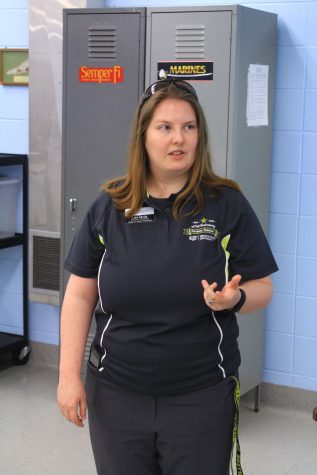Student doubles as airwoman, honors grandfather
Megan Carlson, a staff sergeant in the Air National Guard is studying at Wichita State University this semester.
It was a peculiar-looking scar on her grandfather’s leg that left a young Megan Trent curious.
Trent, a Wichita State student, remembers trips to the local pool with her grandfather, John Murphy, during the summer. She noticed the scar on his thigh, along with a tattoo on his wrist made up of a bunch of numbers.
Grandpa Murphy was a prisoner of war for a year and a half as a soldier in the U.S. Army during World War II.
He was an ammunition bearer and was taken prisoner by German soldiers after coming across an enemy hospital and engaging in a firefight.
“When he was taken prisoner,” Trent said, “he was shot at point-blank range in the leg, and that’s where his scar was from.”
It was customary for POWs to be tattooed with their name and serial number while in the prison camps. That’s where the tattoo on his wrist came from.
Now 30 years old, Trent has served in the Kansas Air National Guard for six years and has been deployed overseas more than six times. She is studying for her Master’s degree in speech-language pathology.
Trent is a boom operator, a technician responsible for refueling other aircraft while in flight.
While on deployment, Trent flies aboard a KC-135 as part of a three-person crew that completes missions all over the world. Besides refueling aircraft, Trent’s crew may also be tasked with carrying cargo or transporting wounded soldiers from Afghanistan to hospitals in Germany in what’s called an aeromedical evacuation.
“A lot of the injuries that I saw were traumatic injuries, brain injuries, cranial-facial stuff,” Trent said. “Some had to do with breathing and airways.”
Trent found herself increasingly interested in the rehabilitation of those soldiers who may have communication difficulties due to their wartime injuries.
“If we can’t communicate as just a person, in general,” she said, “you feel like you’re sort of at a deficit to being a productive member of society … That would be great to help these people rehabilitate and get to that point, to be able to function.”
And that’s how Trent found herself in WSU’s Master’s degree program. She is in her second semester.
Juggling student and military life doesn’t come without its challenges, though. Trent lives in Lindsborg, Kan., about an hour-drive north of Wichita. Besides traveling to Wichita for classes, she drives to Forbes Field in Topeka once or twice a week in order to be deployable at any moment’s notice.
Last semester, Trent was deployed to Germany just before the end of the semester. She worked with her instructors to make sure projects and finals were finished before leaving.
“I had every opportunity in the world to be just as successful as anyone else who was here for the entire semester,” she said, “which was fantastic. They were all very supportive of what I was doing.”
Family and friends back home in Lindsborg helped take care of Trent’s house and dogs during her deployment. Even the local police department would occasionally drive by the house to make sure everything was safe.
“The saying around the military is that your family and friends serve, too,” she said, “and that’s absolutely true.”
The military/student lifestyle fits Trent, she said. The travel opportunities are numerous. The mathematics, controls and switches fascinate her.
“I just wanted to serve my country and be a part of something bigger than myself,” Trent said. “And until you actually see it and experience it, you don’t understand.”
And the best part, she said, is bridging the generation gap between current U.S. military and veterans, especially the ones she interacts with at the Lindsborg American Legion Post.
“There’s people in our generation that are going to carry on all the hard work that [veterans] did,” Trent said.
“It’s not just going to fall by the wayside,” she said. “Because we pick up where they left off and we continue to carry that mission in serving.”













